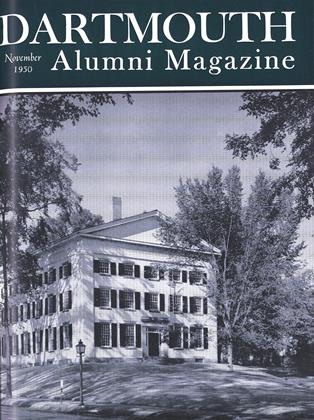Dartmouth men who were in college during the presidency of William Jewett Tucker, between 1893 and 1909, have never forgotten him as the man whose personal influence upon them, especially as he spoke to the student body assembled in Rollins Chapel on Sunday afternoons, was the deepest experience of their undergraduate years.
In the series which begins this month the ALUMNI MAGAZINE plans to reprint portions of Dr. Tucker's chapel talks and later to continue with selections from his writings and other addresses. Dartmouth men of "the Tucker generation" will have their own reason for welcoming this series; for the alumni of later classes we hope to provide the rich experience of knowing better one of the great figures in Dartmouth's history.
In its selections the MAGAZINE will have the assistance of Robert F. Leavens 'Ol, who for several years has been engaged in a study of the addresses and writings of Dr. Tucker with a view to the publication of a memorial volume.
IN his first chapel talk after being elected President, Dr. Tucker said, in part:
"You are not made for the College, but the College for you. It is yours to let the institution do for you what its honorable record designs. The College is a grand impersonality. It asks no favors, it makes no bargains with men; it gives freely. In its great work the past is forgotten. One generation pre- pares for another. The best sign of its impersonality is that each generation does its work, buries itself and gives place to another. It is in this spirit that I accept the present responsibility. What has been done makes possible what is to be done. As the College grows in years a sentiment grows in our hearts we cannot put away. There is something hallowed about the old institution. . . ■
"Do not go out of college as fragmen- tary men, when it is your privilege to go out strong, solid, candid men. Do not go out a physical wreck nor a spiritual bit of pulp.' As I shall urge athletics for their own sake, so I shall urge spir- itual exercise for its own sake. I shall make no concessions in either case."
It was not until 1903 that The Dart-mouth began to report the chapel talks. The following is from one of the ear- liest accounts:
"I wish to speak to you this evening about a very commonplace subject, the sense of time. "We call nature to our aid—the seasons, the months, and the days—to make real our thought of time. Time means life under limitations. Saint Paul talked of the power of the endless life to come. Tonight I speak of the power of the life which ends. The man who gains great riches sud- denly, does not know their value. He has so much that he does not know how to use it. We are apt to think that we have a great amount of time on our hands and so we underestimate the value of the present.
"A man must learn to realize the j power of the present. One should not expect any more of a period in the fu- ture than he expects of the present, for one can never do the thing he wants to do in the future better than today. It will take just the same amount of work and just the same amount of courage to break a sin then as now. I assure you, the temptations of middle- life are just as strong as those of youth.
"A man ought to accustom himself in sufficient terms to give meaning to this power of the present. If the day does not satisfy you, take some other unit of time. The statesman who has been elected to Congress says, 'Here is a unit of time, six years, in which I will accomplish certain tasks.' You men in college have a unit, four years, in which you set yourselves to do certain things. Get something into your minds of the reality of the present. Construct some- thing big enough to satisfy your own desires and aspirations. But construct it so that the past and the future may have access to the present. There can be no isolated present. Think of your future and let the man that is to be come back into the man that is. Answer his questions, meet them squarely. We are living a life under limitations and no one knows what those limitations are. Get hold of reality, of fact, of the present. Whether you make your life little or big, make it real."
PRESIDENT TUCKER
 View Full Issue
View Full Issue
More From This Issue
-
 Article
ArticleA Detective Story From the Far North
November 1950 By ELMER HARP JR -
 Class Notes
Class Notes1918
November 1950 By ERNEST H. EARLEY, DONALD L. BARR, DAVID L. GARRATT -
 Class Notes
Class Notes1905
November 1950 By GEORGE W. PUTNAM, GILBERT H. FALL -
 Article
ArticleConvocation Address
November 1950 -
 Class Notes
Class Notes1923
November 1950 By TRUMAN T. METZEL, COLIN C. STEWART 3RD -
 Article
ArticleAssociated School News
November 1950







